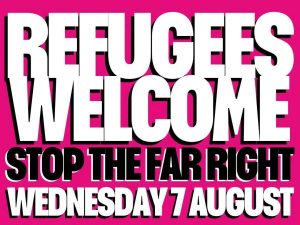The BBC is at it again – this time with the race riots.
Corporate media and politicians have spent years fanning the flames of racism through blaming immigration for peoples’ insecurities.
Even as the build up of such messaging leads to far right riots across the country, the BBC has demonstrated it doesn’t want to find solutions to the issue.
According to @BBCNews just now we have GOT to distinguish between the peaceful far-right protests and the violent far-right protests.
Our public service broadcaster is LITERALLY toeing Nigel Farage’s line, unquestioningly. This is how we got her. Normalising racism #FarageRiots pic.twitter.com/znMRCqBtc9
— Canary (@TheCanaryUK) August 5, 2024
The immigration ‘debate’: racism in a dress
According to the BBC segment, we should stand up for the right to be racist, as long as we’re not violent.
In the UK, only 5% of land is used for homes and gardens. That means all 67m of us live in the country with 95% of the land left for other uses. To be sure, 71% of UK land is used for agriculture. And no one’s saying we should develop throughout our countryside. But the idea that the UK is ‘full’ or that levels of immigration are ‘unsustainable’ is simply not true.
Additionally, to immigrate to the UK, one needs either a job offer, significant capital, education prospects or UK ancestry. The immigration levels are filling gaps in our economy. And UK employers usually must pay an ‘immigration skills charge’ for hiring abroad.
BBC: legitimising the far-right race riots
So what we have here is another instance of the far right agitations of the likes of Nigel Farage and the Daily Mail legitimised by those who appear more moderate, like Keir Starmer and the BBC. Not least when Starmer and Rishi Sunak compete to out-Farage each other at Prime Minister’s Questions. Or when Starmer and unseated former shadow minister Jonathan Ashworth both targeted Bangladeshi people during the election, calling for them to be “removed”.
What these ideas do is provide a political vaneer to racism. They encourage people to dumb down their approach, blaming those perceived as foreigners rather than looking at a fairer system for the worker.
According to these ideas, the UK is somehow the victim of colonisation and replacement, rather than the perpetrator of colonisation and war abroad that contributes to people becoming refugees or seeking better work opportunities in the UK.
Even with the legitimisation of these ideas in the mainstream, 64% of the UK believe immigration has had a positive or neutral impact on the country.
Featured image via Canary – X




